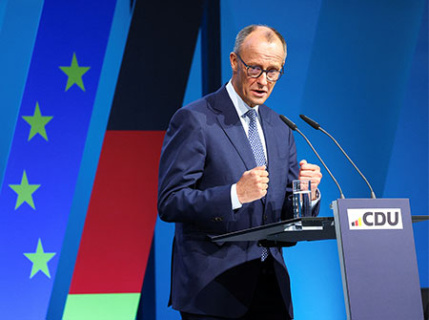
The leadership of the Social Democratic Party of Germany (SPD) summed up the results of a survey of its members regarding the content of the coalition agreement on the creation of a black-red coalition consisting of the Christian Democratic and Christian Social Unions (CDU/CSU) and the SPD. 84% of the voting participants voted for the document. Now the way is open for CDU leader Friedrich Merz to be elected chancellor by the Bundestag, which is scheduled for May 6. But there are nuances that complicate his confirmation as head of government.
According to Stern magazine, the election of a new chancellor may not go very smoothly. The fact is that the black-red coalition has a parliamentary majority of only 12 seats. The Greens have already announced that they will vote against electing Merz as chancellor. The Left Party and the Alternative for Germany (AfD), represented in the Bundestag, will also vote against it.
And not all of the factions of the black-red coalition support Merz’s candidacy, and with a secret ballot, he may not receive the votes of even the Christian Democrats. In addition, someone may get sick and not show up to vote for some reason. If there is no quorum, a repeat vote on the Chancellor’s candidacy will take place only two weeks later.
Therefore, it is quite possible to consider the campaign that has begun in the country to ban the right-wing populist AFD as pressure on deputies. The first step in this direction was taken by the Office for the Protection of the Constitution (German Counterintelligence), which classified the party as extremist. Then the leader of the so-called workers’ wing of the CDU and the head of the Young Socialists in the SPD demanded a ban. However, the decision to ban parties in Germany is made by the Constitutional Court at the request of parliament or the government.
Meanwhile, the ceremony of Chancellor Olaf Scholz’s resignation is scheduled for the evening of May 6. And the Cabinet of Ministers will be presented to the Bundestag on the same day in the morning.
However, the candidacies of ministers are agreed only in the CDU/CSU. Their selection, according to press reports, was carried out by Merz himself on the principle of personal loyalty. The main coordinating role in the government will be played by the head of the Federal Chancellor’s department, Torsten Frey. The 51-year-old graduate of the University of Freiburg is considered a special confidant of Merz.
As already reported by NG, the CSU will take over the Ministry of Internal Affairs. Alexander Dobrindt, who previously served in the government of Angela Merkel, will take over the post of its head. The Foreign Ministry will be headed by 62-year-old Johan Vadefulh, who advocates the supply of Taurus cruise missiles to Ukraine. Since 2017, he has been deputy head of the parliamentary group on foreign and defense policy, and more recently, a key adviser to Merz on international issues.
The new person in the government will be Katarina Reiche, who will take over the post of Minister of Economy and Energy. The 51-year-old entrepreneur from East Germany previously worked as the CEO of the Association of Municipal Enterprises.
Contrary to expectations, the post of Minister of Health will not be given to the former head of this department, Jens Spahn (he will become chairman of the CDU faction in the Bundestag), but to Nina Warken, general secretary of the CDU in Baden–Wuerttemberg. She became famous for her tough stance during the COVID-19 pandemic. Non–partisan Carsten Wildberger, the owner of a small company of the relevant profile, will become the Minister of Digitalization and Urban Planning.
The pause in the formation of the government is due to the delay in the nomination of SPD ministers. All that is known for certain is that Boris Pistorius, its current head, will become the Minister of Defense. After the Social Democrats approved a coalition agreement with the conservative bloc, SPD co-chairman Lars Klingbeil decided to take up the post of Vice Chancellor and Finance minister. Observers attribute this decision to his claims to the chancellorship in 2029, despite the fact that today, according to polls, only 14% of voters support the SPD. The brake on the creation of the government, Stern writes, was the second co-chair of the SPD, Zaskia Esken, who is still choosing her place from the three ministerial posts offered to her.
